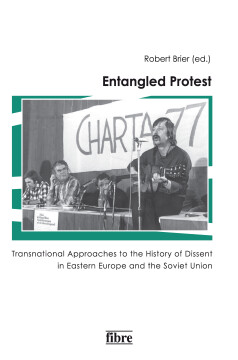Entangled Protest

BOOK
Cite BOOK
Style
Format
Entangled Protest
Transnational Approaches to the History of Dissent in Eastern Europe and the Soviet Union
Einzelveröffentlichungen des Deutschen Historischen Instituts Warschau, Vol. 31
(2013)
Additional Information
Book Details
Abstract
In den späten 1960er Jahren entstand in Osteuropa eine neue Form politischen Protests. Zumeist als »Dissens« oder »Dissidenz« bezeichnet, charakterisierte sie besonders ein unideologischer Ansatz und eine legalistische Vorgehensweise. Dissidenz zielte nicht auf einen politischen Umsturz des Realsozialismus ab; durch eine Verteidigung von Bürger- und Menschenrechten sollte vielmehr eine unabhängige Öffentlichkeit geschaffen und ausgeweitet werden.Die Beiträge zu diesem Band sind Teil eines umfassenderen Vorhabens, die historische Forschung zu Dissens und Opposition in Osteuropa zu erneueren und weiterzuentwickeln. Indem sie eine transnationale Perspektive einnehmen, rekonstruieren sie die Netzwerke, Diskurse und wechselseitigen Perzeptionen, die die osteuropäischen Protestbewegungen miteinander sowie mit Unterstützergruppen im Westen verbanden. Dadurch zeigt der Band einerseits, dass diese Protestbewegungen auch aus wechselseitigen Wahrnehmungen und Interaktionen hervorgingen; andererseits wird deutlich, dass diese Bewegungen in umfassendere Prozesse der internationalen Geschichte der 1970er und 1980er Jahre eingebunden waren wie den Niedergang des Marxismus, die zunehmende Bedeutung der Menschenrechte oder auch das Aufkommen neuer transnationaler Politikformen, die sich auf Fragen des Friedens oder der Ökologie konzentrierten.Starting in the late 1960s, a new form of political protest emerged in the Soviet Union and eastern Europe. Usually referred to as »dissent« or »dissidence«, it was characterised by a legalist and non-ideological approach. Focused on the defense of civic and human rights, the dissidents did not seek to overthrow the communist governments, but to broaden the sphere of a free public discourse.The contributions to this book are part of a broader effort to invigorate and modernize the history of dissent. Sharing a transnational perspective on dissent, they uncover the networks, discourses and perceptions that connected the dissidents with each other and with groups of supporters in the west. Thus, they demonstrate how movements of dissent were shaped by mutual perceptions and interactions and how they partook in broader changes that transformed international politics during the 1970s and 1980s: the eclipse of Marxism, the rise of human rights or the emergence of transnational forms of activism focused on peace or the preservation of the environment.
Table of Contents
Chapters
Entangled Protest
In: Entangled Protest (2013), pp. 11–42
Electromagnetic Forces and Radio Waves or Does Transnational History Actually Happen?
In: Entangled Protest (2013), pp. 43–52
Oppositionists in the ČSSR and the GDR
In: Entangled Protest (2013), pp. 55–85
Writing the Papers
In: Entangled Protest (2013), pp. 87–108
‘Message in a Bottle’
In: Entangled Protest (2013), pp. 109–126
An Escalating Problem
In: Entangled Protest (2013), pp. 129–149
Western European Social Democrats and Dissidence in the Soviet Bloc during the Cold War
In: Entangled Protest (2013), pp. 151–169
The East versus the South
In: Entangled Protest (2013), pp. 173–197
‘Freedom and Peace Are Indivisible’
In: Entangled Protest (2013), pp. 199–227
The Politics of Security Across the ‘Iron Curtain’
In: Entangled Protest (2013), pp. 229–247















